The AnandTech Coffee Lake Review: Initial Numbers on the Core i7-8700K and Core i5-8400
by Ian Cutress on October 5, 2017 9:00 AM EST- Posted in
- CPUs
- Intel
- Core i5
- Core i7
- Core i3
- 14nm
- Coffee Lake
- 14++
- Hex-Core
- Hyperthreading
Benchmarking Performance: CPU Encoding Tests
One of the interesting elements on modern processors is encoding performance. This includes encryption/decryption, as well as video transcoding from one video format to another. In the encrypt/decrypt scenario, this remains pertinent to on-the-fly encryption of sensitive data - a process by which more modern devices are leaning to for software security. Video transcoding as a tool to adjust the quality, file size and resolution of a video file has boomed in recent years, such as providing the optimum video for devices before consumption, or for game streamers who are wanting to upload the output from their video camera in real-time. As we move into live 3D video, this task will only get more strenuous, and it turns out that the performance of certain algorithms is a function of the input/output of the content.
All of our benchmark results can also be found in our benchmark engine, Bench.
7-Zip 9.2: link
One of the freeware compression tools that offers good scaling performance between processors is 7-Zip. It runs under an open-source licence, is fast, and easy to use tool for power users. We run the benchmark mode via the command line for four loops and take the output score.
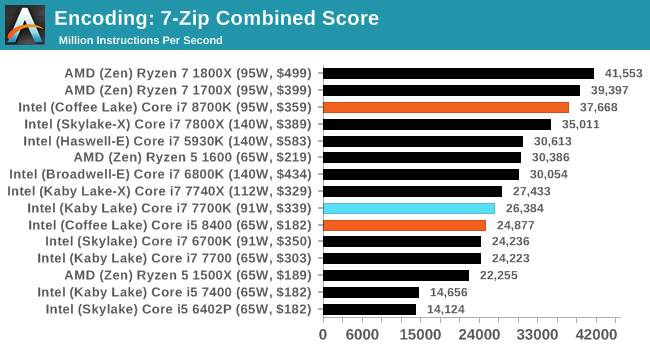
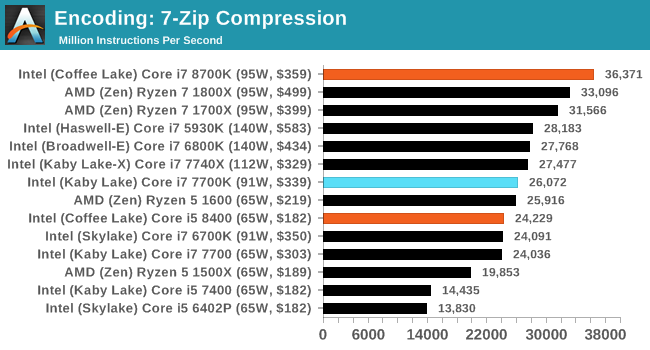
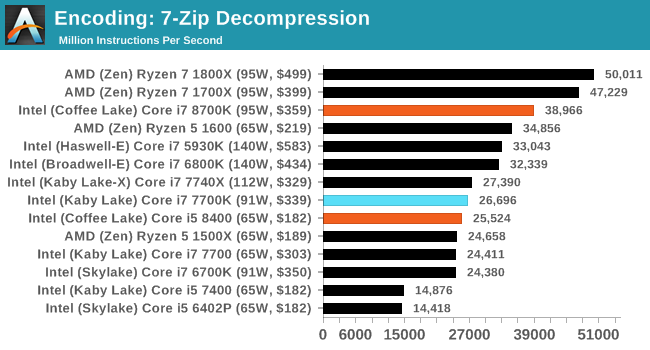
WinRAR 5.40: link
For the 2017 test suite, we move to the latest version of WinRAR in our compression test. WinRAR in some quarters is more user friendly that 7-Zip, hence its inclusion. Rather than use a benchmark mode as we did with 7-Zip, here we take a set of files representative of a generic stack (33 video files in 1.37 GB, 2834 smaller website files in 370 folders in 150 MB) of compressible and incompressible formats. The results shown are the time taken to encode the file. Due to DRAM caching, we run the test 10 times and take the average of the last five runs when the benchmark is in a steady state.
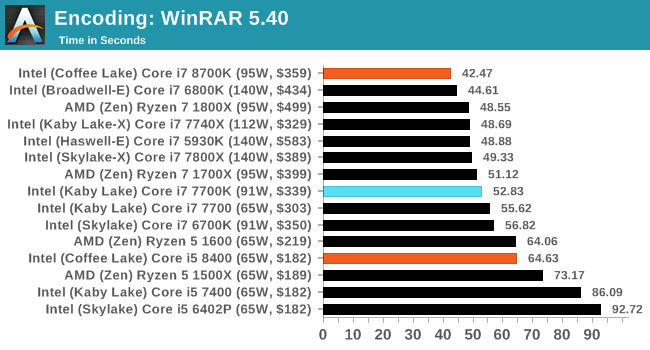
AES Encoding
Algorithms using AES coding have spread far and wide as a ubiquitous tool for encryption. Again, this is another CPU limited test, and modern CPUs have special AES pathways to accelerate their performance. We often see scaling in both frequency and cores with this benchmark. We use the latest version of TrueCrypt and run its benchmark mode over 1GB of in-DRAM data. Results shown are the GB/s average of encryption and decryption.
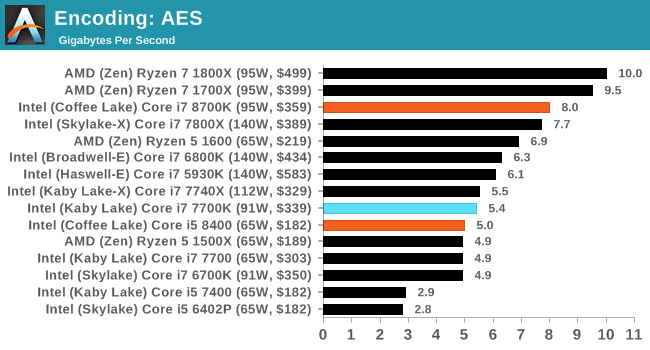
HandBrake v1.0.2 H264 and HEVC: link
As mentioned above, video transcoding (both encode and decode) is a hot topic in performance metrics as more and more content is being created. First consideration is the standard in which the video is encoded, which can be lossless or lossy, trade performance for file-size, trade quality for file-size, or all of the above can increase encoding rates to help accelerate decoding rates. Alongside Google's favorite codec, VP9, there are two others that are taking hold: H264, the older codec, is practically everywhere and is designed to be optimized for 1080p video, and HEVC (or H265) that is aimed to provide the same quality as H264 but at a lower file-size (or better quality for the same size). HEVC is important as 4K is streamed over the air, meaning less bits need to be transferred for the same quality content.
Handbrake is a favored tool for transcoding, and so our test regime takes care of three areas.
Low Quality/Resolution H264: Here we transcode a 640x266 H264 rip of a 2 hour film, and change the encoding from Main profile to High profile, using the very-fast preset.
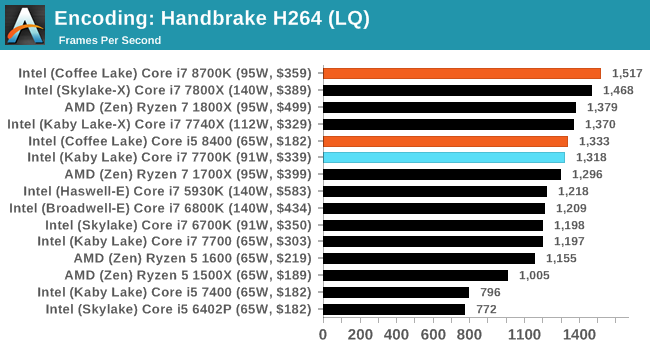
High Quality/Resolution H264: A similar test, but this time we take a ten-minute double 4K (3840x4320) file running at 60 Hz and transcode from Main to High, using the very-fast preset.
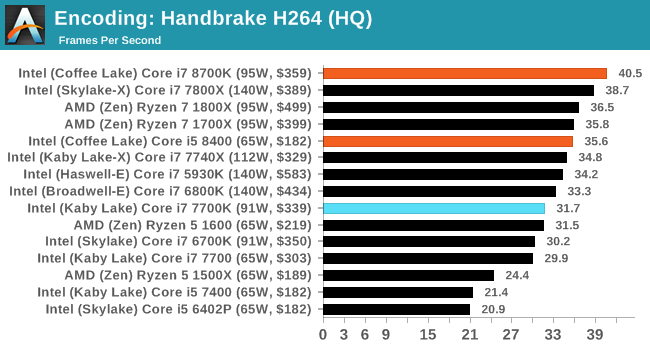
HEVC Test: Using the same video in HQ, we change the resolution and codec of the original video from 4K60 in H264 into 4K60 HEVC.
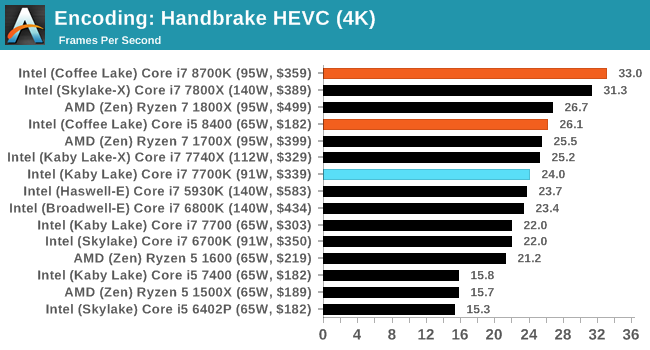










222 Comments
View All Comments
DigitalFreak - Thursday, October 5, 2017 - link
Anyone having an issue with Bench? I'm trying to compare my i7-3770k to the i7-8700k and it comes back with no data. Same with trying the Threadripper 1920xmkaibear - Friday, October 6, 2017 - link
CPU tests changed so benchmarks weren't comparable. Latest processor tested on the old tests was the 7700K iirc, and not everything is tested on the new tests.I'd compare results for the 3770k and the 2600K to get a baseline then you can compare 2600K to the 8700K. It's a bit fiddly, I have to do the same with my 4790K.
Ian Cutress - Saturday, October 7, 2017 - link
We updated our CPU testing suite for Windows 10 in Q1. Regression testing is an on-going process, though it's been slow because of all the CPU launches this year. Normally we have 1/2 a year. We're so far at what, 6 or 7 for 2017?mczak - Thursday, October 5, 2017 - link
Doesn't look to me like the die size actually increased at all due to the increased gate pitch.The calculations in the article forgot to account for the increase of the unused area (at the bottom left) - this area is tiny with 2c die, but increases with each 2 cores added significantly. By the looks of it, that unused area would have grown by about 2 mm^2 or so going from 4 to 6 cores, albeit I'm too lazy to count the pixels...
jjj - Thursday, October 5, 2017 - link
Your conclusion is weirdest thing ever, you fully ignore the 8359k and AMD.In retail, the 8350k will do very very well and retail is what matters for most readers
And ignoring AMD is not ok at all, it's like you think that we are all idiots that buy on brand.You do think that, your system guides make that very clear but you should not accept, support and endorse such an idiotic behavior.
AMD got hit hard here, Intel takes back the lead and it's important to state that. Sure they might have Pinnacle Ridge in a few months and take back the lead but buyers that can't wait should go with Intel right now, for the most part. AMD could also adjust prices ofc.
Tigris - Thursday, October 5, 2017 - link
Really confused why the pricing listed in this review isn't consistent- for Intel you were posting prices you found online, but for Ryzen you appear to be posting MSRP.The truth is- you can find 1700x for $298 right now EASILY (Amazon), yet Microcenter is selling the 8700k for $499.
If you factor this information in, the AMD solutions are still far more valuable per dollar.
wolfemane - Thursday, October 5, 2017 - link
I really can’t belive the amount of flak Anandtech takes these days. I find it un-earned an unwarrented. Out of all the tech sites and forums I manage to read in a given week, Anandtech is the most often quoted and linked to. Hell I use it as my go to for reference and comparison (and general reading). My only big complaint is your ads, and I’d gladly pay a sub to completely remove that nonsense and directly support the site!Ian, you and your staff deserve far more credit than you get and that’s an injustice. Each piece is pretty thorough and pretty spot on. So for that thank you very much.
This article is no exception to the rule and is superb. Your graph layouts are a welcome feature!!!!! I look forward to your ever expanding tests as new chips roll in. I think the 8600k is going to be a game changer in the i5 vs i7 performance category for these hexacore cpus. I think that’s why almost all the reviews I’m reading today are with the 8700k and 8400.
Agin, thank you and your staff very much for the work you put into publishing amazing articles!!
vanilla_gorilla - Thursday, October 5, 2017 - link
Personally I buy whatever is best at the time. Right now I'm typing this on a 1700x and I can see a 4770k build on the desk next to me. So it's always funny to see the bias. Intel review gets posted, AMD fanboys come out of the wood works to trash them as paid shills. But it works exactly the same on any positive AMD reviews. Intel fans come in trashing them. It's really odd. Anandtech is one of the most unbiased sites I've found and I trust their reviews implicitly.mkaibear - Saturday, October 7, 2017 - link
> Anandtech is one of the most unbiased sites I've found and I trust their reviews implicitly.Yep. Anyone who looks at AT and sees bias needs to examine their own eyesight.
SeannyB - Thursday, October 5, 2017 - link
For the H.264 encoding tests, you could consider using the "medium" preset or better. The "very fast" preset has a tendency to use fewer cores.